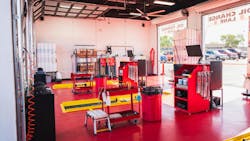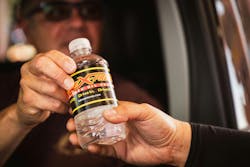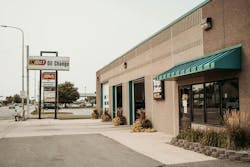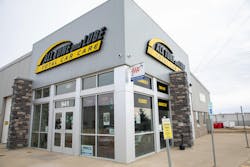Quick lube industry career duration may vary. Some people choose to stay for a lifetime, and others are just passing through.
In the 2024 NOLN Operator Survey (sponsored by Valvoline), 42% of respondents reported their average lube tech tenure as one-to-three years. When it comes to manager tenure, 33% reported the average as five-to-10 years.
Think about it this way: the average quick lube shop employee is around for at least a year. That’s plenty of time to make an impact on that individual’s life.
As a leader, there is value in building a team that lives and breathes intentional service and care. From the work environment to the interactions with customers, the blueprint of a quality quick lube brand is founded on culture.
Setting Expectations: Christopher Potter of Lube X-press in El Paso, Texas
Something emphasized at El Paso, Texas-based, multi-location Lube X-press is a “WOW experience” that extends to everyone.
“We feel like anytime a guest chooses us, that’s really a privilege for us to know that they trust us to take care of their vehicles, and we don’t take that lightly at all,” Christopher Potter says.
Potter is the executive leader of talent and culture at Lazo Management, which is the corporate owner of Lube X-press locations.
Lube X-press team members are expected to be friendly, transparent, and caring. Each interaction with a customer begins with a smile and a complimentary bottle of water.
Potter says new hires are given their own “WOW experience” that starts at the corporate level and trickles down through leadership and into each shop setting—establishing a workplace that people want to be part of.
“Our thing is, if we have that approach, we feel like our team members value that and in turn this allows them to make our guests feel welcome and provide the brand standard,” Potter says.
Potter also points to the “prestigious” look of the Lube X-press shops. Pride is taken in their branding and how they present it to the world, and potential hires notice this as well.
But it’s not just Lube X-press aesthetics that put their best foot forward. The people who are hired are expected to do the same. Potter says they need to have an “X” factor.
“Our expectations are high, they truly are,” Potter says. “It’s not easy to get hired by us, but it’s definitely worth it.”
There is a thorough vetting process with hiring. This is how they distinguish the difference between the people who simply want a job, and those who want to make a real difference, Potter explains.
Quality employees help enforce the high standards at Lube X-press, with a culture that Potter describes using the words “collaboration,” “empowering,” and “rewarding.” The team trusts one another, the brand, and its processes.
As a result, he says team members can take confidence in knowing that they have the support and tools to help them be successful in “doing things right every time the first time.” It helps continue to set the standard that keeps the “WOW experience” top-of-mind and inspires return business from customers.
“We don’t tell our staff what to do, we tell them why it’s done,” Potter says. “I feel like our team universally appreciates this approach, as it makes them feel part of us and not just a number.”
Potter says they do quite a bit of cross-training at their shops, with a focus on defining responsibilities and offering a refined approach to speaking with and educating customers. Teamwork is a huge component of this, enabling what Potter describes as “engagement amongst our team by executing call outs (and) ensuring checks and balances are done. And I think our guests really feel like that’s a transparent approach.”
In line with keeping people informed, Potter also says that managers frequently go over goals, metrics, and KPIs with team members—it keeps everyone on the same page and boosts motivation.
“Our thing, and I feel like our team members embrace this, is that we’re not just an oil change shop—we feel like we’ve really built an industry-breaking identity. There’s a blueprint there that we’ve created that’s proven and we feel like we’re ready to take off.”
Taking off is in the plan for Lube X-press, as Potter explains that the brand is ready to become player on the national stage with its franchise opportunities, which Lube X-press launched last year. Working with franchise partners will allow the brand to take the “WOW experience” even further. Culture is a group effort, and it's one that Lube X-press takes seriously.
“And I do have to give great kudos to our ownership, corporate team, director of operations, district managers, and shop managers from raising our culture and enforcing that,” Potter says. “We don’t have any issues typically with holding anyone accountable. We feel like you’re either on board with our culture or you’re not the right fit for the brand.”
Shop Owner Perspective: Jeff Perreault, Mike’s In Out Oil Change of Alexandria, Minnesota
Jeff Perreault runs his shop with a smile—literally. Making people grin and laugh while they’re at Mike’s In Out Oil Change is a huge win in his book. This focus on positivity finds its way into the shop employees and their workflow. Perreault spoke with NOLN about a few components of this approach.
As told to Hanna Bubser
Repeat business is our biggest thing we aim for.
But I also told my staff just this morning, “If I start driving this thing with only profit in mind, we’ve already had the wheels fall off. We’ve got to drive it putting the customer first, so we do a consistent job every time, so the customers want to come back.” We do have to do it fast and efficiently but going too fast on short staff; that's when mistakes happen. So, I think our mission statement is let’s just do it right and do it with a smile.
If you can make them laugh, they’re coming back.
We try to make the customers comfortable while they are waiting in line; make them smile. As for my write-up people, I work really hard at that—trying to make the customer smile—and I’ve got to make sure I have personalities in place that CAN do that. But also, between my cashiers, or whoever is closing the sale or whoever opens the door for the customer will say, “Hey, go do something fun the rest of the day,” or “Take the rest of the day off.” We always say that just to close it and the customers kind of chuckle, you know?
I’m the king of practical jokes, but I also expect (my team) to practical joke me.
It’s a two-way street. It can’t be just one-sided. I have a 16-year-old homeschooled young lady who works here. When she started, she looked at the floor, and she had trouble interacting with everybody. She’s been with us almost a year, and now if I go outside and put something in a dumpster—she'll lock me out, because she knows my keys are on my desk! That’s exactly what we want. This young lady wants to go into the car business and I feel this job is a great stepping stone for her. She learns how to interact with other employees, and she learns how to interact with the customers.
We are a pipeline to our local farm equipment dealers for their scholarship programs.
These young gentlemen or young ladies, whoever wants to go into the agriculture/diesel business, we’re a pipeline.
We partner with our local farm equipment dealer for sponsorships to help get their tuition and tools paid for. I don’t just send anybody there; they have to be a good fit. I’m happy to say that we have about eight guys and gals that went into the agricultural or small engine fields after working here and then graduating from college.
They work for us part time and then when they do their internship, they go to work for a local farm equipment or powersports dealer. But in that process, they’ve had their two years of school. It’s a great resource for me, and for the kids too.
An example of team comradery at the shop:
We have a gentleman here, he’s one of our managers. He’s 50 years old. His family has a history of heart problems. Well, he went to get a stint put in yesterday. I texted him before he went in for the procedure, and one of the other employees saw me doing that and she said, “This is why I work here. You honestly care about us.”
That was one of the greatest compliments anybody could give me. He went through the procedure and now he needs open heart surgery ... so, we all know we’re going he’s going to be out for six months, but we’ll just work around it. We are more concerned about his health than we are about being shorthanded.
Six years ago, when we bought this (shop), this thing was going really well already.
It was up and on its way. The previous owner wanted to retire, and he said, “This thing’s going to do double the business in two years.” Well, it does better than that. We had four employees when we started, and we have 18 right now. We keep the shop clean and up to date, that along with our culture is noticed by our customers when they’re sitting in their car or in the lobby. They hear how we interact. They hear how we give each other a hard time, just for fun.
I also enjoy listening to our customers. My office is right off the lobby, so I can hear the customers interacting with each other. I often hear customers comment on how fun it is to hear our guys having fun and enjoying what they do.
I think that, for me personally ... that is a great compliment to see the employees smiling and laughing out there, because the customers pick up on it. They feed off it because then they’ll chime in. I think that’s what I’m trying to build here—and we’re not successful every day, but you’ve got to look at the big picture.
Shop Owner Perspective: Russell Hotchkiss of All Tune and Lube Total Car Care of Cedar Rapids, Iowa
Russell Hotchkiss’ shop embodies productivity through employees who are committed to a timely and high-quality work output. Motivated employees at All Tune and Lube Total Car Care invest in their own success—which funnels into success for the shop. Hotchkiss gave NOLN some insight into how this mentality plays out in everyday operations.
As told to Hanna Bubser
We want to treat people the way we want to be treated.
And then, we even go one step further: We treat you or your family or friends like you would want your grandmother treated if she was 3,000 miles away.
But you’ve got to go to where the core of that came from. I own two other businesses, and I have over 20 vehicles in a fleet and over 23 years in business.
Up until I opened this (shop) ... nine years ago, I thought I had friends taking care of my vehicles at different automotive shops—and they weren’t. So, I opened my own to take care of my own fleet, and if we could help other customers not get screwed along the way—then that was a benefit.
There’s a front and a back to an automotive repair facility.
The front—those guys are very fun, very knowledgeable, (and) can speak with the customers. They’re down to Earth, they make (the customer) laugh and feel at home because they’re interacting directly with the customer.
However, on the back end, those guys are—not that the front isn’t—they’re after the pay. They want to make sure that they don’t have comebacks because they don’t want that docked from their pay or (to) have to work on something a second or third time—which takes away from their ability to make money—because then they’re losing money because they have to redo something and all they’re on is the clock and not on their commission.
We look to see if (potential new hires) actually have entrepreneurial spirit.
Are they getting certifications at their other place? Have they been in a leadership role? Do they understand we’re trying to beat the clock—understanding that we can’t have comebacks? It just looks bad on not only them, but on the company itself, even though we weren’t the ones that had the hand on the equipment. So, we’re looking for those types of things: making sure they understand (that) time’s money. The more time you waste, the more money you waste.
Did they get their ASE certifications or any other certifications—whether it’s from a dealership or third-party vendors? Did they invest in themselves? Did they buy their own tools? How much do they have in tools?
We look to see if they’re hungry and whether or not they’re confident enough to invest in themselves—because if they don’t invest in themselves, then why are you asking me to do it?
We’re laid back and low-key, but we’re also fun-having and slightly competitive.
I’m an open book (with) management, so they actually see: How much did we generate? How much did each of them generate? What was their proficiency? They see all those numbers week in and week out. So, they know who’s pulling their weight and who isn’t.
It’s not like when you go to the dealership and all the work is given to just the most senior person there.
If you can show your worth and that you’re comfortable doing things, we will give you more work. We don’t play favorites. Well, we kind of do—we play favorites to the ones (who) are productive, not just the ones (who) have been there for a long period of time, have their tenure in, and we’re just feeding them to keep them happy.
It’s going back to that slightly competitive thing—but also proving that you can handle what’s been given to you. And they do help each other out because they know that if they can help that other person out, then if they get in a pinch later and need some help, they’ll get it reciprocated to them.
The ones who do well here, they understand what their goal is.
Obviously, the goal is to have the highest proficiency (and) not have the comebacks—which translates into dollars weekly, which increases their paycheck, which increases the overall revenue of the company—those things. They get here, they get it done, they don’t complain, (and) they understand the more that they can get through in a shorter period of time, the more they make, the more the company makes. Those are the successful ones.
The ones (who) aren’t successful sit there and complain and stay on their ... phone and their proficiency is only 50% instead of 100% and they’re not doing the weekly revenue goals, they're doing half of that. Basically, their proficiency tells you, they’re only doing half of what they could do. We have benchmarks and measurements that we go through every week.
Shop Stats: Team Dynamics
Quick lube teams may each have their own distinct dynamics, but there are trends worth recognizing. Data from the 2024 NOLN Operator Survey Report showcases how shop operations consider employees. Special thanks to Valvoline for sponsoring the 2024 NOLN Operator Survey Report.
Employees Per Store:
0-5: 34%
5-10: 43%
10-15: 14%
15-20: 6%
20+: 3%
Average Hourly Wage for All Lube Techs:
$11-$13: 7%
$13-$15: 24%
$15+: 69%
Do you give commission/bonus to techs?
31% No
69% Yes
Average Weekly Hours Per Tech:
4% Less than 35
45% 35-40
51% 40+
Repeat Customers:
51%: 50%-75% (most common answer)
About the Author
Hanna Bubser
Editor
Hanna Bubser is the editor of National Oil and Lube News and has been writing about the automotive aftermarket since 2022. She has a bachelor's degree in English from Hamline University in St. Paul, Minnesota. As a teenager, she drove a green 1996 Jeep Cherokee that was previously used as a forest service vehicle. Currently, she drives a 2019 Subaru Impreza. She's an avid bumper sticker collector and loves adorning her vehicle with brightly-colored conversation starters.




